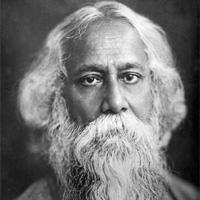Remembering Rabindranath Tagore: Honoring a Legend on His Birth Anniversary
By Dr. Mohini Shinde
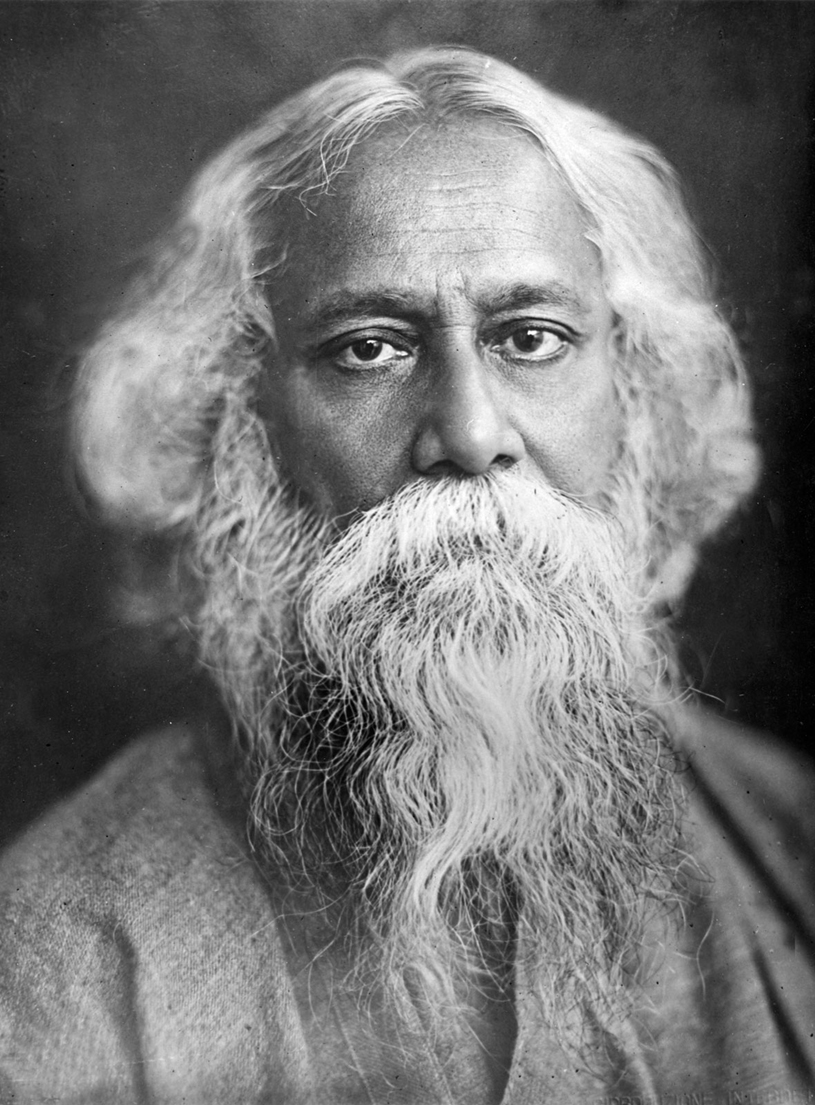
People widely celebrate Rabindranath Tagore, a towering figure in literature and the arts, especially on his birth anniversary on May 7. Born on May 7, 1861, Tagore was not only a seminal figure in Indian culture but also a beacon of intellectual and artistic achievement globally.
In 1913, Tagore became the first Asian to receive the Nobel Prize in Literature, making his legacy particularly notable.
Tagore received this Nobel Prize for his book “Gitanjali,” a collection of poems he personally translated from Bengali into English. Officials bestowed the prize for Tagore’s profoundly sensitive, fresh, and beautiful verse, which he used to express his poetic thought in his own English words, making it a part of Western literature. This recognition was not just a personal achievement but a moment of great national pride for India, serving as a bridge between Eastern and Western literary traditions.
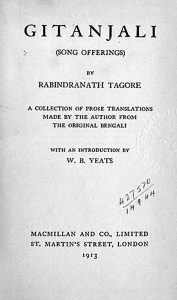 Tagore’s work extends beyond poetry; he was also a philosopher, educator, painter, and composer. His songs, known as Rabindra Sangeet, are an integral part of Bengali culture to this day. Tagore’s ideas on education and internationalism remain deeply influential, as he envisioned a world where humanity transcended geographical and cultural boundaries.
Tagore’s work extends beyond poetry; he was also a philosopher, educator, painter, and composer. His songs, known as Rabindra Sangeet, are an integral part of Bengali culture to this day. Tagore’s ideas on education and internationalism remain deeply influential, as he envisioned a world where humanity transcended geographical and cultural boundaries.
People around the world celebrate his legacy, especially in India and Bangladesh, where they observe his birth anniversary with great reverence. Educational institutions, literary societies, and cultural groups often organize readings, performances, and discussions to honor his contributions to literature and society.
Thus, remembering Rabindranath Tagore on his birth anniversary not only honors his personal achievements but also celebrates the rich and enduring impact he has had on the world stage.
Tagore has been the subject of numerous books and articles. Therefore, rather than simply restating the obvious in this article, we will delve into a few topics that haven’t received as much attention as others.
Tagore’s interaction with world leaders
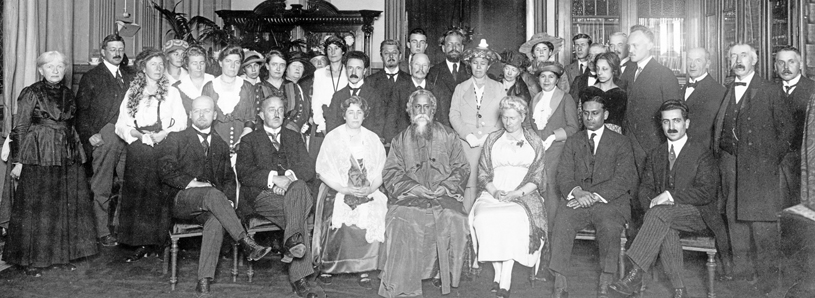
Rabindranath Tagore (1861-1941) Indian poet, novelist and playwright. He is the first Indian winner of a Nobel Prize. Photo: In 1920, Rabindranath Tagore visited the Netherlands and was photographed (a ‘quick snap with artificial light’) in the building of the Vrije Gemeente on the Weteringschans in Amsterdam.
Tagore was an extensive traveler; his travels helped him develop a deep appreciation for diverse cultures and philosophies. Over his lifetime, he visited more than thirty countries on five continents. His works reflected these experiences, emphasizing universal humanism over nationalism. Tagore met with several prominent figures and leaders across the globe, including Mahatma Gandhi, Albert Einstein, Romain Rolland, and H.G. Wells.
Tagore’s interaction with Mahatma Gandhi
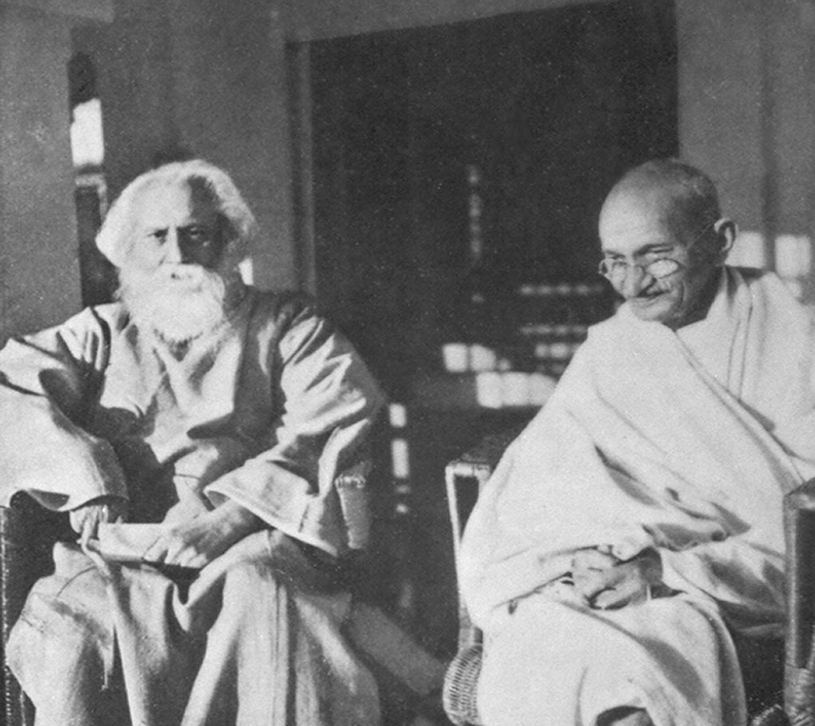 Deep mutual respect and thoughtful disagreements marked the relationship between Tagore and Mahatma Gandhi, two towering figures of Indian history and culture. Their interactions encompassed a wide range of discussions on various aspects of Indian society, politics, and the path to independence from British rule.
Deep mutual respect and thoughtful disagreements marked the relationship between Tagore and Mahatma Gandhi, two towering figures of Indian history and culture. Their interactions encompassed a wide range of discussions on various aspects of Indian society, politics, and the path to independence from British rule.
- Mutual Respect: Tagore and Gandhi held each other in high esteem. Tagore famously bestowed the title ‘Mahatma’ on Gandhi, which translates to “great soul,” a term that became synonymous with Gandhi’s identity. Gandhi, in turn, revered Tagore as “Gurudev,” or “great teacher.” Their respect was evident in their personal correspondence and public acknowledgements of each other’s contributions.
- Philosophical Differences: Despite their mutual respect, they had significant philosophical differences, particularly concerning the means of achieving independence and the nature of a post-colonial Indian society. While Tagore promoted a more individualistic and artistic approach, emphasizing education, freedom of thought, and cultural development, Gandhi often centered his approach on mass movements and a strict code of personal and communal discipline.
- Nationalism and Internationalism: Tagore was critical of some aspects of Gandhi’s Swadeshi movement, which advocated the boycott of foreign goods. Tagore believed in a more inclusive and international approach, fearing that extreme nationalism could lead to isolation and xenophobia. He was wary of the potential divisiveness of strong nationalistic fervor and often advocated for a more universal and humanistic approach.
- Views on Modernity and Tradition: Gandhi’s vision included an idealized version of an ancient Indian village society that was self-sufficient and free of industrial influence. In contrast, Tagore was more open to embracing modern ideas and technologies that could enrich Indian society without compromising its cultural identity.
- Personal Interactions: Their personal interactions often involved exchanges of letters discussing these themes. Tagore visited Gandhi at his ashrams, and they engaged in dialogues that were both personal and philosophical. Their disagreements were public but respectful, contributing to a broader discourse on the future of India.
The relationship between Tagore and Gandhi illustrates a profound dialogue between two different visions for India, each influential in its own right, and their legacy continues to influence discussions on ethics, governance, and cultural identity in India and beyond.
Tagore’s interaction with Albert Einstein
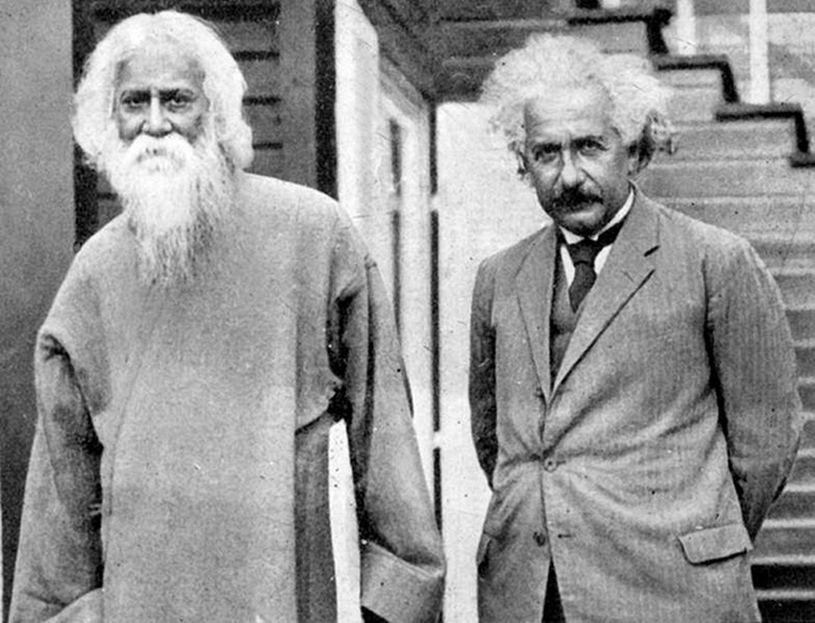 Tagore’s interaction with Albert Einstein is one of the most fascinating intellectual exchanges in history, bridging the worlds of science and literature, East and West. Their conversations delved into the nature of reality, truth, and beauty, offering a rare glimpse into how two great minds from seemingly disparate fields could find common ground and yet respectfully differ.
Tagore’s interaction with Albert Einstein is one of the most fascinating intellectual exchanges in history, bridging the worlds of science and literature, East and West. Their conversations delved into the nature of reality, truth, and beauty, offering a rare glimpse into how two great minds from seemingly disparate fields could find common ground and yet respectfully differ.
Tagore and Einstein met several times during the early 1930s. These meetings were characterized by discussions on fundamental questions concerning the universe, the nature of truth, and the pursuit of science and art. Not only did their dialogues reflect their personal philosophies, but they also underscored the intellectual climate of the era, marked by a growing questioning and exploration of the boundaries between different disciplines.
The most famous of their discussions took place in 1930 at Einstein’s home in Caputh, near Berlin. Their core debate revolved around the separation of human perception and beauty from human experience, as well as the independence of truth from humanity.
Einstein’s View: Einstein believed in an external universe independent of human perception, rooted in objective truths that scientific methods could ascertain. He argued, “If there is no human being any more, the Apollo of Belvedere no longer remains beautiful. “No longer by itself, anyway.”
Tagore’s Perspective: Tagore, on the other hand, held a more human-centric view, arguing that truth and beauty are human interpretations of the universe. He believed that truth is a human construct, deeply intertwined with human perception. He stated, “This is a human world—the scientific view of it is also that of the scientific man.”
The dialogues between Tagore and Einstein were significant because they highlighted the possibility of profound respect and mutual inquiry between individuals rooted in different intellectual traditions. While Einstein approached the conversation from a scientific realist standpoint, Tagore presented a perspective grounded in relational realism, which sees the universe through the lens of human interconnections.
Scholars continue to study and appreciate the Tagore-Einstein conversations for their depth and open-minded spirit, symbolizing a bridge between the sciences and the humanities and between Eastern and Western ways of thinking about the world.
Tagore’s interaction with Romain Rolland
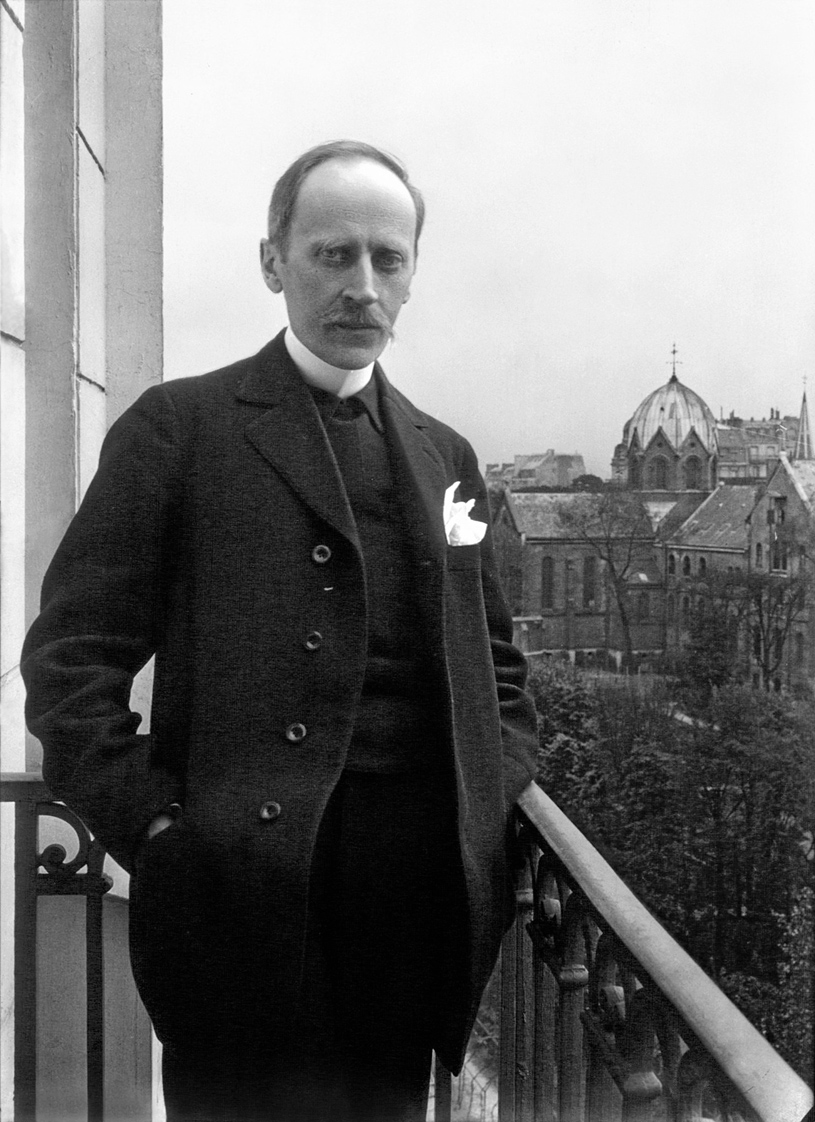 Tagore’s interaction with Romain Rolland, another luminary of the early 20th century, is a remarkable chapter in the story of cultural and intellectual exchanges between the East and West. Romain Rolland was a French dramatist, novelist, and essayist, and like Tagore, he was also a Nobel laureate, celebrated for his deep humanism and commitment to international cultural exchange.
Tagore’s interaction with Romain Rolland, another luminary of the early 20th century, is a remarkable chapter in the story of cultural and intellectual exchanges between the East and West. Romain Rolland was a French dramatist, novelist, and essayist, and like Tagore, he was also a Nobel laureate, celebrated for his deep humanism and commitment to international cultural exchange.
Romain Rolland was one of the Western intellectuals who greatly admired Tagore and his philosophy. Rolland was deeply involved in Europe’s cultural life and was an ardent advocate for peace and non-violence, which resonated with Tagore’s own ideals. Their interactions were part of a broader dialogue between Western and Eastern intellectuals during a time when there was a significant interest in Indian philosophy and spirituality in Europe.
Tagore and Rolland shared a common belief in the power of art and culture to foster international understanding and peace. They discussed various issues related to nationalism, universalism, and the role of culture in shaping society. Both intellectuals were critical of aggressive nationalism and believed in a more inclusive view of humanity that transcended national boundaries.
Universal Humanism: Both Tagore and Rolland promoted the idea of universal humanism, which connects people beyond their national or cultural identities. They held the belief that cultural and artistic exchanges, emphasizing shared human values, could foster true understanding among nations.
Critique of Nationalism: Tagore’s skepticism of nationalism, particularly in its more aggressive forms, found a sympathetic ear in Rolland. Tagore expressed concerns about nationalism leading to parochialism and conflicts, while Rolland’s anti-war stance, especially during and after World War I, aligned with Tagore’s views on the destructive impacts of nationalistic fervor.
The correspondence and personal meetings between Tagore and Rolland enriched both their worldviews. Rolland’s respect for Tagore was evident in his writings and advocacy of Tagore’s work in Europe, which helped introduce Tagore’s literary and philosophical ideas to a broader audience. Tagore’s interactions with European intellectuals, such as Rolland, validated his belief in the universality of his message and the relevance of Indian thought to global issues.
Their interaction is a testament to the power of intellectual and cultural exchange in fostering mutual respect and understanding between different worlds. It highlighted the role of intellectuals and artists in bridging divides and promoting a vision of humanity that is inclusive and compassionate. This legacy of dialogue continues to inspire those who seek to bridge cultural and ideological divides through understanding and empathy.
Through these interactions, Tagore not only represented India on a global stage, but also brought back valuable insights and ideas that contributed to India’s cultural and educational reform. His conversations and disagreements with leaders like Gandhi highlighted his belief in a more inclusive and comprehensive approach to understanding human progress and governance.
Celebrating Tagore Today
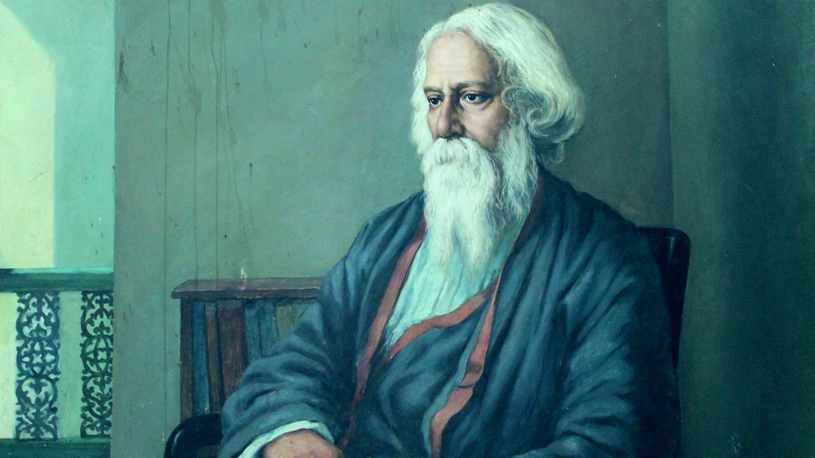
Events across the globe celebrate Rabindranath Tagore’s birth anniversary, honoring his diverse contributions to literature, art, and philosophy. Communities and cultural institutions worldwide organize a variety of activities, from elaborate poetry readings that breathe new life into Tagore’s verses to vibrant musical performances inspired by his compositions. Art galleries curate special exhibitions showcasing his paintings, inviting viewers to delve into the visual aspect of his creativity.
Theatrical groups stage adaptations of Tagore’s plays, highlighting his innovative contributions to drama and performance art. Educational forums and workshops explore his educational philosophies, drawing lessons on how they might inform contemporary teaching practices. In addition, digital platforms offer webinars and virtual exhibitions, making Tagore’s work accessible to a global audience and fostering a digital dialogue around his enduring relevance.
Such commemorations not only honor Tagore’s legacy but also serve as an introduction to his work for those yet to discover the depth of his genius. Participants from diverse backgrounds unite in appreciation of a visionary who championed the universal values of love, empathy, and interconnectedness by engaging with his creations and ideals. These events underscore the timeless nature of Tagore’s contributions, demonstrating how his ideas continue to resonate and inspire in today’s world. Through these global tributes, we reaffirm our commitment to carrying forward Tagore’s vision of a world where creativity and humanism flourish in harmony.

